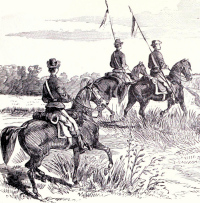HOMEWARD BOUND.
In camp, twenty-five miles north of Springfield, November 4th. At nine o’clock this morning we were in the saddle, and our little column was in marching order. The Delawares led, then came our band, the General and his staff followed, the Body-Guard came next, and the Sharp-shooters in wagons brought up the rear. In this order we proceeded through the village. The Benton Cadets were drawn up in line in front of their camp, and saluted us as we passed, but none of the other regiments were paraded. The band had been directed to play lively airs, and we marched out to merry music. The troops did not seem to know that the General was to leave; but when they heard the band, they ran out of their camps and flocked into the streets: there was no order in their coming; they came without arms, many of them without their coats and bareheaded, and filled the road. The crowd was so dense that with difficulty the General rode through the throng. The farewell was most touching. There was little cheering, but an expression of sorrow on every face. Some pressed forward to take his hand; others cried, “God bless you, General!” “Your enemies are not in the camp!” “Come back and lead us to battle; we will fight for you!” The General rode on perfectly calm, a pleasant smile on his face, telling the men he was doing his duty, and they must do theirs.
We travelled with great rapidity and circumspection; for there was some reason to suppose that parties of the enemy had been thrown to the north of Springfield, in which case we might have been interfered with.
Fremont’s Hundred Days in Missouri was published in three installments in The Atlantic Monthly. The anonymous author appears to have been a member of Fremont’s staff with a disdainful bias towards Missourians, even those who were pro-Union.
